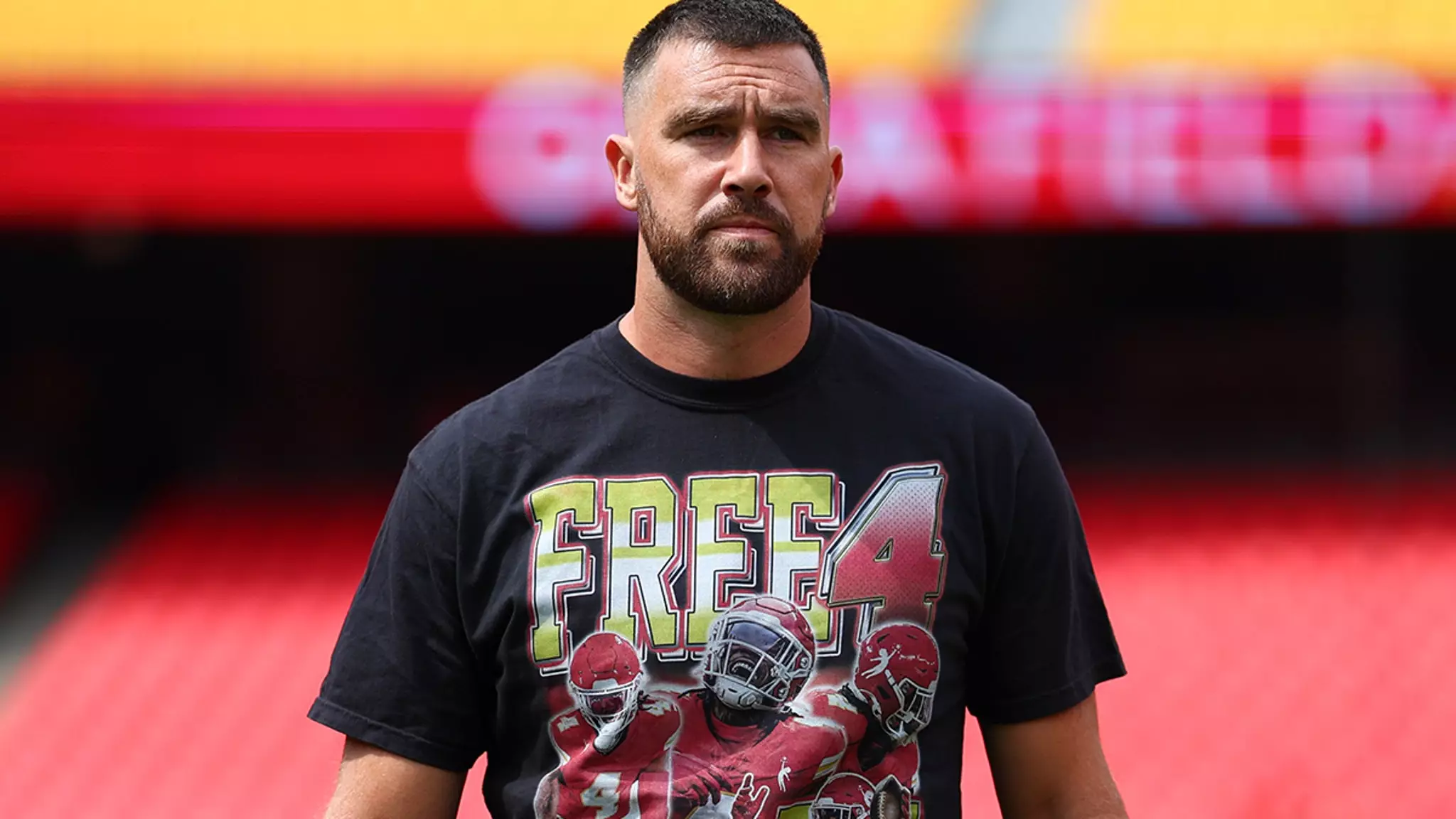In the high-stakes world of professional sports, athletes are more than just entertainers; they are influential figures whose actions resonate far beyond the game. When Travis Kelce chose to wear a “Free 4” shirt during pregame warmups, it was intended as a show of support for his teammate Rashee Rice. However, this gesture ignited a firestorm of criticism, revealing the complex relationship between athletic loyalty and social responsibility. Kelce’s action might appear as a harmless team solidarity gesture on the surface, but it underscores how athletes’ choices can inadvertently endorse controversial behaviors, especially when those behaviors involve legal or moral pitfalls.
The backlash wasn’t merely about team camaraderie; it highlighted the societal implications of publicly supporting someone embroiled in serious legal issues. Rashee Rice’s past misconduct—racing at high speed, fleeing the scene of an accident, and pleading guilty to felonies—casts a long shadow over any attempt at a supportive display. Kelce’s gesture, intentional or not, risked minimizing the severity of that misconduct, inviting criticism from those who see such displays as tacit approval. This incident underscores how athletes’ influence extends beyond the field, and that their choices can inadvertently endorse or undermine societal standards.
The Ethical Dilemma in Support and Loyalty
Supporting teammates is a cornerstone of team culture, but it becomes problematic when support crosses into the realm of endorsing questionable behavior. Kelce’s gesture, alongside teammate Tyquan Thornton’s similar attire, suggests a willingness within some circles of athletes to prioritize loyalty over accountability. Critics argue that this loyalty should not come at the expense of moral clarity, especially when public figures have the platform to advocate for responsible conduct.
This incident raises a broader question: Should athletes use their influence to critique or challenge their peers’ actions publicly? Kelce and Thornton’s support appeared to be motivated by camaraderie, but it inadvertently sent a message that might be interpreted as dismissive of serious legal and ethical concerns. The irony lies in the fact that these athletes, celebrated for their influence, may be neglecting their potential to serve as role models by ignoring the seriousness of Rice’s past violations. Their silent support contrasts sharply with the need for social responsibility that comes with public prominence.
Legal and Moral Accountability in the Spotlight
The controversy also touches on the critical issue of accountability. Rashee Rice’s legal troubles—racing at dangerous speeds, fleeing from the scene—are behaviors that endanger lives and undermine societal norms of responsibility. While the NFL’s six-game suspension is a form of institutional accountability, critics like attorney Marc Lenahan argue that true accountability extends beyond sanctions and into moral support. Lenahan’s criticism that Kelce and Thornton could, instead of merely wearing shirts, consider aiding Rice financially or publicly advocating for victims exemplifies a disconnect. It highlights the societal expectation that public figures should leverage their influence to promote justice and reparations, not just team spirit.
Furthermore, the stark contrast between Rice’s legal issues and the public support from prominent athletes accentuates the ongoing debate about the ethical boundaries athletes navigate. Are they merely supporting their teammates, or are they risking tacit endorsement of irresponsible behaviors? The weight of public opinion suggests that support must be coupled with responsibility, especially for individuals who hold sway over millions of fans and impressionable youth.
The Influence of Words and Symbols in the Age of Social Media
In today’s digital era, symbolic actions like wearing a shirt or posting a supportive message carry weight far beyond their initial intent. Kelce’s shirt, while a fleeting gesture, becomes a symbol within the rapidly spread landscape of social media. Such symbols are often read as endorsements, whether or not that was the original purpose. Athletes must recognize that their every gesture is scrutinized, analyzed, and often weaponized against the ideals of integrity and social responsibility.
By donning the “Free 4” shirt, Kelce inadvertently blurred the lines between team loyalty and societal values. What might seem at first glance like unity can quickly be perceived as endorsement of harmful behavior, especially when the backdrop of Rice’s legal history unfolds. As role models, athletes should be mindful that their influence extends into the social fabric, shaping perceptions about justice, morality, and accountability.
The Responsibility of Athletes as Public Figures
This incident serves as a stark reminder that athletes are not simply entertainers—they are influential figures capable of shaping societal values. While loyalty and team support are fundamental, they must be exercised responsibly. Kelce’s gesture, and the broader reactions surrounding it, advocate for a more critical view of what it means to support a teammate. True support involves accountability, acknowledgment of wrongdoing, and a commitment to fairness.
Athletes have the power to inspire positive change, but that power demands responsibility. Their actions, even the smallest symbolic gestures, can carry the weight of societal influence and must be wielded thoughtfully. Kelce’s display, viewed through this lens, is more than just a team gesture; it is a testament to the need for athletes to be deliberate about the messages they send—messages that can influence perceptions of justice and morality long after the game is over.

